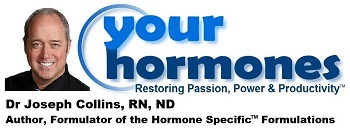
Urinary Incontinence During Menopause
Urinary incontinence in perimenopause, menopause & postmenopause women are often associated with urethral atrophy, which may occur concurrently with vaginal atrophy. The female urethra functions best when optimal estrogens & androgen function maintain peri-urethral collagen, and androgens maintain urethral tone. In addition, vaginal dryness and change in vaginal flora is a predisposing factor.
Since low testosterone and low estrogen are the most common hormone related causes of urinary incontinence in women of menopause age. While Urinary incontinence may be due to either low testosterone or low estrogen, it is more likely to be problem if a woman has both ow testosterone and low estrogen.
Since low estrogen is the most common cause of urinary incontinence in women of menopause age, consider EstroMend™, especially if there are also other symptoms low estrogen.
Since low testosterone is also a common cause of d urinary incontinence in women of menopause age, consider TestoGain™ , especially if there are also other symptoms low testosterone.
While decreased estrogen and testosterone are a common cause of urinary incontinence in perimenopause, menopause & postmenopause, other hormonal causes should also be considered.
It is important to note that excessive progesterone may cause urinary incontinence due to its relaxing effect on the peri-urethral muscles. Urinary incontinence is one symptom of excessive progesterone, so any type of progesterone replacement should be used carefully.
It should also be noted that bladder irritants can cause urinary incontinence including, Carbonated drinks, tea and coffee (with or without caffeine), artificial sweeteners, corn syrup, or any food of beverages that is high in spices, sugars, acids (such as citrus and tomatoes). Any foods you are allergic to (such as dairy), can also aggravate your bladder. Even if you have tolerated these foods for years, they may be more irritating with perimenopause, menopause & postmenopause.
Since it is possible to have more than one hormone imbalance, more than one of the Hormone Specific™ Formulations may be appropriate. Look at the symptoms associated with each major hormone imbalance to help you determine the most likely cause of these symptoms.
Consider EstroMend™ if you have other symptoms associated with low estrogen, which may include hot flashes; night sweats; feeling more depressed; more withdrawn or isolated; feel periods of hopelessness; feel apathetic; feel a loss of energy; feel more fatigued; feel less receptive to sex; feel less sensual; feel that your sex drive is diminished; increased vaginal pain, dryness or itching; insomnia, difficulty falling to sleep or difficulty staying asleep; trouble with your memory; having trouble remembering names; more forgetful; mood is low, less upbeat, less positive or less outgoing; less “good moods’ and times of joy; caring less about things that used to matter to you; trouble controlling your urine; have to urinate more often; spill urine when you cough or sneeze; your perception is weakening, it takes you longer to notice things; trouble thinking of the right word when speaking or writing; your mental skills are diminishing.
Consider TestoGain™ if you have other symptoms of low testosterone, which may include decreased libido; less sexual fantasies or less sexual desire; less likely to become sexually aroused; less pleased with sex; feeling more irritable; feeling less composed and in control; feeling less motivated in general; less assertive; less energetic; becoming anemic, or think you are anemic; low blood pressure; less muscle strength; you feel weaker; having more trouble with mental skills requiring logic and problem solving; having trouble focusing and maintaining your attention; memory weakening; trouble remembering things and events; feel more depressed; mood is low; less confident; feeling frightened or afraid.
Other Considerations
Even though urinary incontinence in menopause may simply be due to changes in hormones that can be addressed with one or more of the Hormone Specific™ Formulations, it is important to discuss these symptoms with a healthcare professional to make sure that there is not a more serious medical condition that needs to be addressed.
If there are other symptoms that may be due to menopause changes, consider using the Menopause Type® Questionnaire to do a more comprehensive analysis of which hormone problems may be involved.
